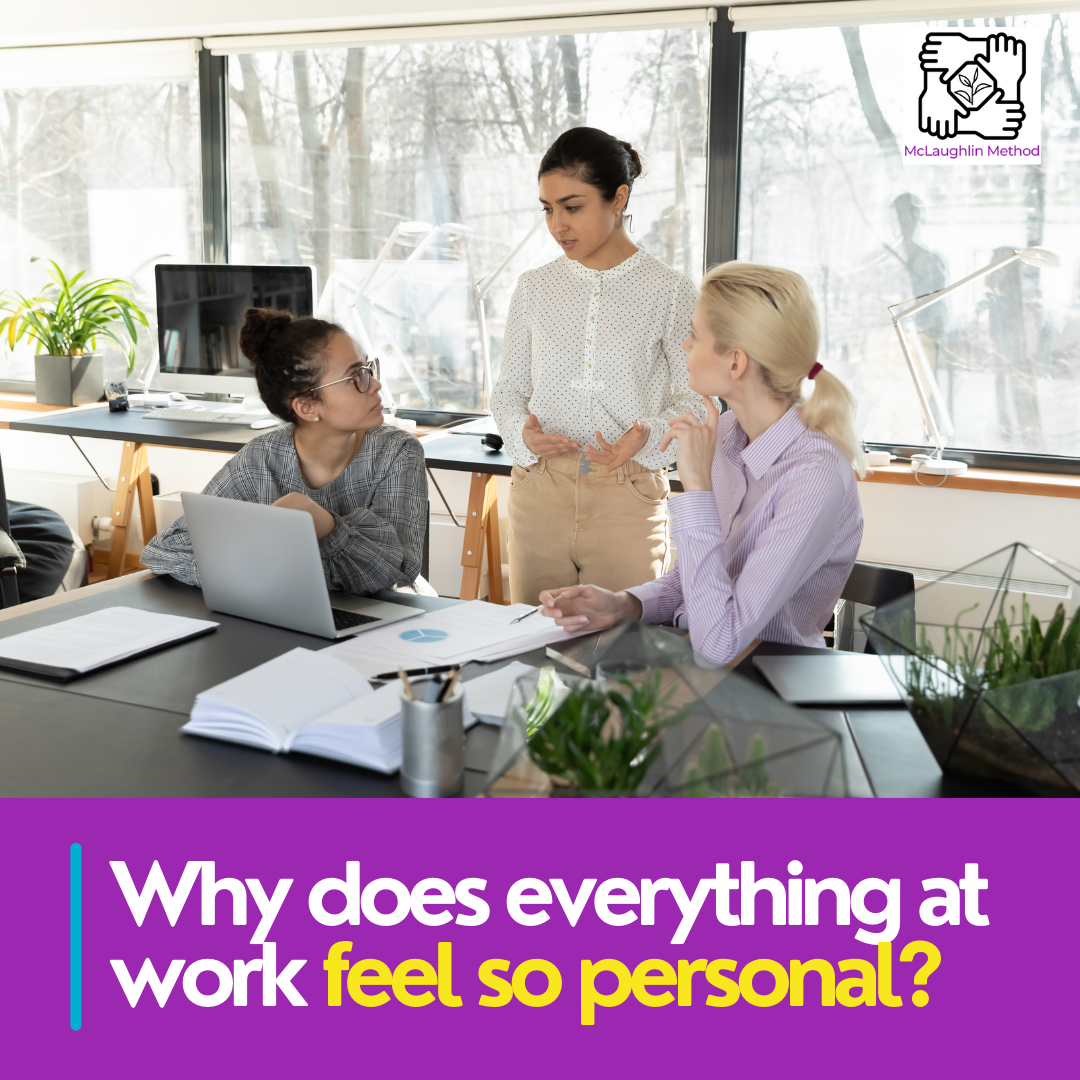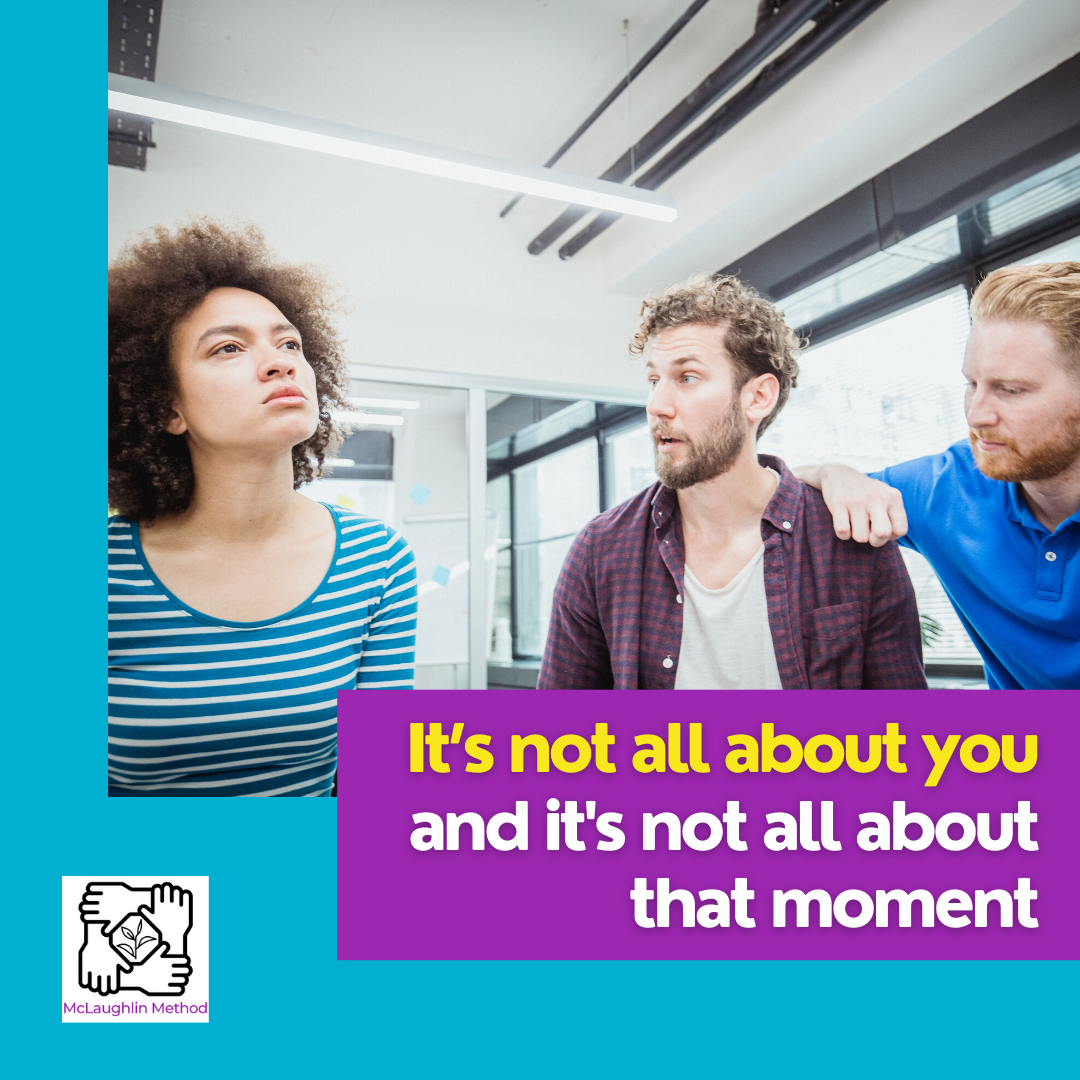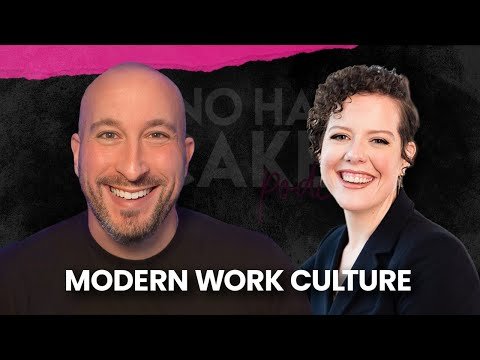Is it Personal? Why conflict at work is not all about you.
It’s not about you.
Why can everything at work feel so personal?
If you’re any kind of leader – especially one who is trying to lead deliberately – it is so easy to take things personally. Because you are trying to be more of your authentic self at work.
So when we face conflict at work, especially an outburst or lashing out, we can immediately think it has to do with us. We are blame seekers. Trying to put things into neat and tidy boxes of “good” or “bad”.
What if we step back and consider how someone’s reaction isn’t about us?
At Capacity, Depleted
Have you ever found yourself in a situation at work where you just couldn’t take any more discussion, decisions, considerations?
When we get past our point of comfort or willingness to contribute, our emotional regulation abilities tend to erode.
We spend a lot of time in the workplace, regulating our emotions and being careful about what we say. And we do it more than we think we do. It has just become so much a part of the way that we show up at work that over time, we’ve reached our fill.
We've reached our ability to exercise restraint in different conversations, and sometimes we just need to be done. When we’ve reached our fill – and many of us blaze past that point too easily at work – we are more irritable, frustrated, and likely to say something we don’t mean to.
Being able to control our impulses - our habitual emotional and physical reactions - is expected in the workplace. Depending on how challenging the workplace is for us, we can get depleted FAST. And our willpower to care about and take actions to regulate our emotions or impulses, is a finite resource.
Willpower can be recouped or restored. Think of it like a battery—our ability to maintain composure, correct our behavior and regulate our emotions is like a battery. It's a finite resource so we have to find opportunities to recharge.
Other things that can drain this battery also include our personal life circumstances. We could be having frustrations or trouble in our relationships at home, with our families or with our children. Many people are still navigating the work from home setup so the personal and professional lines are almost non-existent.
This is why our personal lives are still causing an impact on our ability to show up at work to be productive.
We also have to think about other personal emotional things that actually drain and deplete our batteries every day.
Grief is a big one. This is a personal one for me right now. I have to recognize that my batteries are starting from a lower standpoint even if I don't feel like I am extra emotional on a particular day. It is still an undercurrent that is always there.
Although it’s not your responsibility to know everything about a person and understand all the things that might be affecting them, awareness is helpful.
Having awareness of different circumstances impacting or contributing to someone's reactions helps you to take their reactions less personally. It is really crucial that we are aware that there are many different situations that are going on and that there are circumstances that we're not even aware of that could be impacting how someone shows up in the workplace.
We should take into consideration our physical, emotional, and mental health. Many of us process things differently at different paces at different rates. There is no correct way to process, just like there’s no correct way to behave or act in the workplace.
The Power and Achilles Heel of Pattern Recognition
Think about the individual relationships that we have at work.
There are many reasons why we get along with people at work and why we don't.
For every relationship where we don't feel like we click with someone, that is going to drain our batteries and our willpower to regulate our emotions.
This also includes your relationships with your leaders, your peers, and other people across the organization.
These relationships can be depleting for us especially with leaders who are a bit removed from us at work. We are making assumptions - looking for patterns - to create our perceptions of them based on how they treat their employees and you as an individual.
We can fall into habits where we assume that our opinion is going to be shot down or someone isn’t going to listen to us. We make a lot of assumptions about what people think about us and how we're being perceived.
We do it unconsciously where we don't even realize that our actions are being impacted by our assumptions about the people we're interacting with.
As humans, our brains are looking for pattern recognition.
The fastest way to utilize less brain power is by association and neuro-patterning: where we group different experiences and relate them to each other in our brains.
It helps us to do more complex tasks, because we have recognized patterns. One of the most complex things that humans do is drive cars. There’s so many things to pay attention to - scanning for anything out of the ordinary, staying within the speed limit, responding to traffic lights and signs. And despite that, we all have had experiences where we barely remember driving somewhere. We were lost in thought or conversation. And our brain did all the complex activities of driving without us being entirely conscious about it.
This patterning is ripe for getting stuck at work.
These are called fiber tracts in the brain. A visual for understanding how these neural-pathways work: picture a dry riverbed. Water will always want to go through that riverbed because it is so well worn.
This is what’s happening with pattern recognition—as soon as we recognize a pattern, our brain automatically puts it in that same riverbed or same category.
We can create a riverbed of expected behaviors based on someone’s past history at work. Expecting someone to say a certain thing, respond or behave in a particular way. We have to watch for this as leaders. Ask yourself questions like:
Could there be some other reason why this person’s reacting / behaving this way?
What am I making this behavior mean?
Is this out of character behavior actually inappropriate? Or just surprising?
Now let’s think about the pattern recognition your team has.
No matter how good of a leader you are, you will always be battling someone's past history, patterns and experience of having bad leaders before you.
They're always going to be comparing you and your leadership to past leaders they’ve had, whether they’re good or bad. We don’t realize we’re doing these things because these are the subconscious things that are influencing our behaviors at work.
Even in a situation where we have had the most amazing manager in the past, we might be scrutinizing and be critical of our current manager who isn't actually doing anything wrong.
That source of comparison becomes very challenging to reconcile and to measure up to because we are not conscious of it and that causes our relationships to degrade.
It’s not all about you and it's not all about that moment.
So what can we do?
Start to notice when you are taking things personally at work. Sometimes, it can be about you, but more frequently, we make things about us when there’s not remotely a connection.
Talk with your team members. Ask them how they are doing.
When you face conflict with someone, take a deep breath, and work to understand your own reaction before you act.
Use “I” statements like “I noticed you had a strong reaction to that conversation” or “I was surprised you said what you did” to describe your experience. Then follow that up with a statement like “help me understand what you meant when you said…” or “help me understand what’s behind that reaction you had”.
These statements open the door to honest, clear communication with your team members and help you steer clear of any unintended resentment, disappointment, or shaming of the other person.
TAKE ACTION
Dealing with conflict at work? Taking things personally?
Get help unpacking what’s going on and how to move on in a new way.
Sign up for a single coaching session for guaranteed results.
“Once you break past your own limited worldview and lens, your awareness changes. Awareness is the first step towards behavior change.”
(c) 2019 - 2024 Katie McLaughlin, McLaughlin Method














